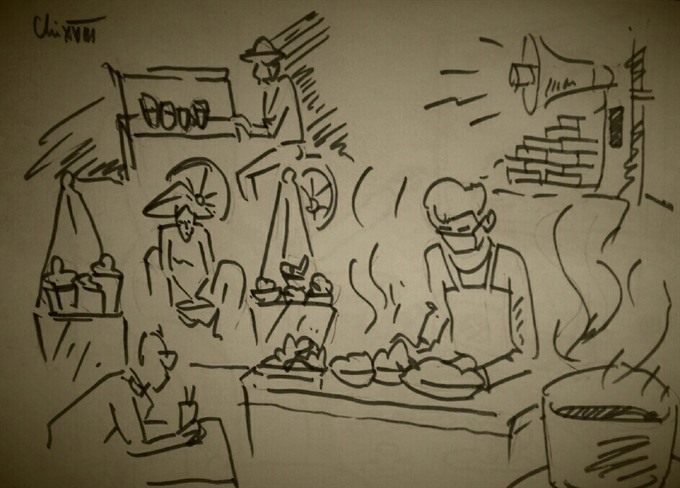 Society
Society

Nguyễn Thu Hương, a resident of Hà Nội’s Đống Đa district, was worried when she saw street vendors preparing food without gloves.
 |
| Illustration by Đàm Minh Trí |
by Mai Hiên
HÀ NỘI – Nguyễn Thu Hương, a resident of Hà Nội’s Đống Đa district, was worried when she saw street vendors preparing food without gloves.
She complained several times but was repeatedly ignored. With a strange look, one person asked, “if you are worried about food safety, why do you still eat street food?”
A new Government degree mandating higher fines for food safety violations may ease Hương’s concerns.
Set to take effect on October 20, the decree will set fines at up to VNĐ200 million (US$5,840) or seven times higher than the value of the goods. These rates are 3.5 times higher than those set by a 2013 decree.
Food sellers found to use plant and animal products that fail to meet veterinary hygiene and quarantine inspection requirements will be fined between VNĐ20 million and 40 million ($854-1,709).
Fines between VNĐ40 million and 50 million ($1,709-2,130) will be levied on those who use banned chemicals or sell meat from animals culled due to disease if the goods are worth less than VNĐ10 million ($427). If the value is over VNĐ10 million, the resulting fine will be VNĐ80-200 million ($3,410-8,540).
Street vendors who fail to wear gloves while serving ready-to-eat food will be fined between VNĐ500,000 and VNĐ1 million, almost double the previous punishment.
The new decree was praised by customer and sellers alike, who agreed it will help street vendors meet food safety requirements.
Nguyễn Thị Sinh, owner of a food stall in Hà Đông market, told Việt Nam News she supports the regulation.
“I always wear gloves while preparing food to keep the food and my customers safe,” she said, adding that touching food with her bare hands would keep customers away.
Nguyễn Thành Nam, another food vendor, said he was unaware of the new rule and how it works. However, he said he would follow the rule even if it is inconvenient.
“I think that the majority of residents will welcome the new decree,” Hương said. “Many street stalls don’t meet hygiene and food safety standards because the food is left uncovered.”
Hương hopes the fines are strictly enforced so vendors improve the quality of their food.
As for me, I agreed with Hương. Our conversation reminded me of an incident that happened 10 years ago.
One day, my colleague and I went out to buy bread at a street vendor on Quán Sứ Street. As the seller – an old woman – didn’t wear gloves while preparing bread with fried eggs for us, we could see her long, dirty nails touching the food. I swore never to buy bread at her stall again.
While requiring gloves is a positive step, many people are still skeptical over its feasibility.
According to Nguyễn Duy Thịnh of Hà Nội University of Science and Technology, touching prepared food with one’s bare hands can transmit viruses and bacteria. However, he warned that sellers might wear gloves to appease inspectors, and then take them off when officials leave. They also might use the same gloves to handle money and prepare food.
Laywer Bùi Đình Ứng from the Hà Nội Bar Association said the tougher fines are necessary.
He also warned that punishment alone is not enough, suggesting a dissemination campaign to inform food service workers about their responsibilities.
Ứng said the many regulations that have been issued were not effective. He pointed to the Law on Tobacco Control and Prevention as an example.
Although the law took effect in May 2013, many people still smoke in public places and workspaces throughout the city. Few people are ever fined.
“The regulations need to be implemented fairly, otherwise there will be disagreements,” Ứng said. “If some people get fined while others who commit the same infraction do not pay, people will be unhappy.”
Đặng Xuân Cường, another lawyer, agreed. He cited the Government Decree 155/2016/NĐ-CP on administrative penalties for environmental violations as another failure.
People continue to litter in public spaces despite the fact that fines increased tenfold in February of last year. Cường blamed the failure on a lack of awareness amongst residents and a shortage of enforcement staff.
Global Cancer Observatory statistics and data from hospitals report over 126,000 cancer cases and 94,000 cancer-related deaths each year in Việt Nam.
Deputy Chairman of the Việt Nam Cancer Association Nguyễn Bá Đức said the three factors that affect cancer are genetics, pollution and diet.
In particular, agents from unsafe food have the largest impact, accounting for 35 per cent of cases. Genetic factors account for only five to ten per cent.
It is undeniable that street vendors are part of city life. They are a popular choice because they provide a variety of food, ready in moments for a reasonable price.
The new decree is a positive step to promote the health and rights of customers, but it will take a concerted effort to implement it effectively.
It is time to raise awareness among sellers, food suppliers and customers. Safe food involves every step of the process from planting or breeding to consumption. If raw materials with unknown origins or high levels of pesticides are not properly processed and preserved, they could have serious health consequences for consumers.
Customers can take responsibility for what they consume by being aware of safe food practices and ensuring they only eat food from hygienic establishments. — VNS




